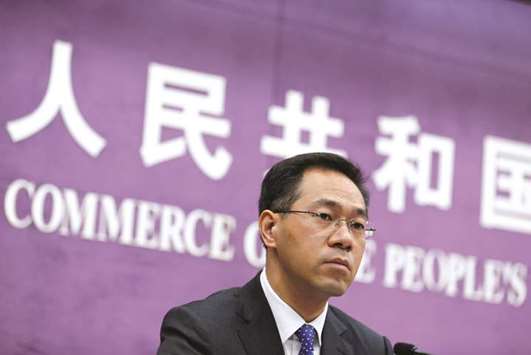China’s commerce ministry yesterday accused the United States of being “capricious” over bilateral trade issues, and warned that the interests of US workers and farmers ultimately will be hurt by Washington’s penchant for brandishing “big sticks”.
Previous trade negotiations with the United States were constructive, but Beijing has had to respond in a strong manner due to the US tariff threats, commerce ministry spokesman Gao Feng said.
President Donald Trump threatened on Monday to hit $200bn of Chinese imports with 10% tariffs if Beijing retaliates against his previous announcement to target $50bn in imports.
The United States has alleged that China is stealing US intellectual property, a charge denied by Beijing. Washington’s accusations of forced tech transfers are a distortion of reality, and China is fully prepared to respond with “quantitative” and “qualitative” tools if the US releases a new list of tariffs, Gao told a regular briefing in Beijing.
China could hit back at US firms listed on the Dow Jones Industrial Average if Trump keeps heightening tensions with Beijing over trade, state-controlled Chinese tabloid The Global Times said yesterday.
The 30-stock Dow, which counts Boeing Co, Apple Inc and Nike Inc among its constituents, fell 0.17% on Wednesday and has declined 0.25% this year. By contrast, China’s benchmark Shanghai Composite Index has slumped 13.1% year-to-date.
“It is deeply regrettable that the US has been capricious, escalated the tensions, and provoked a trade war,” Gao said. “The US is accustomed to holding ‘big sticks’ for negotiations, but this approach does not apply to China.” White House trade adviser Peter Navarro, who views China as a hostile economic and military power, said on Tuesday that Trump’s actions are a necessary defence of the “crown jewels” in the US economy.
None of the US administration’s efforts to negotiate with Beijing has yielded progress on changing China’s “predatory” trade practices, Navarro said.
He maintained that China had more to lose from a trade war.
Financial markets are worried about an open trade conflict between the world’s two biggest economies after three rounds of high-level talks since early May failed to reach a compromise on US complaints over Chinese practices and its record deficit with China.
Last year, the deficit was about $375bn, as China imported $129.89bn of US goods, while the United States purchased $505.47bn of Chinese products, according to US data.
A Sino-US trade war could disrupt global supply chains for the tech and auto industries, sectors heavily reliant on outsourced components, and derail world growth.
“US unilateral protection measures will ultimately harm the interests of US companies, workers and farmers,” Gao told reporters.
British forecaster Oxford Economics, in a recent note, said it “will not be easy for the US to identify $200bn worth of Chinese imports that it can levy tariffs on without hurting US companies and/or consumers, given the strong involvement of US companies in a large share of China’s exports to the US.”
Gao said that China and the US are due to negotiate on issues around the manufacturing and service industries in the near future.
Chinese shares fell yesterday on investor worries about the trade dispute, with the Shanghai index languishing at a two-year low and stocks of about 100 firms down by the daily limit of 10%.

China’s Ministry of Commerce spokesperson Gao Feng attends a news conference at the commerce ministry in Beijing. Previous trade negotiations with the US were constructive, but Beijing has had to respond in a strong manner due to the US tariff threats, Gao said.
